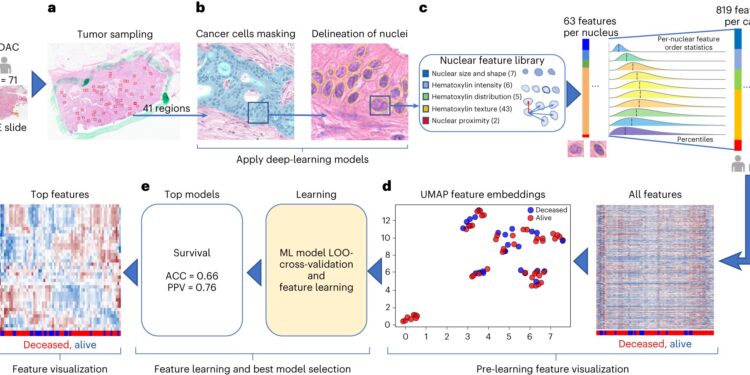Computational pathology pipeline. a, b, Images of random tumor nests selected by a pathologist in digital H&E slides (a) are sent for processing by deep learning models to provide a mask of tumor cell nuclei (b). c, Extraction of downstream nuclear features and formation of order statistics of morphology and H&E staining features in nuclei under the mask in cohort patients. d, Patient-level visualization of features extracted by clustergram (right) and UMAP (left) plots. e, Feature learning by multiple ML models using a Leave-one-out (LOO) cross-validation strategy to identify models that can predict survival with the highest accuracy. f, Visualization of the main features learned by the best survival prediction models. The main features were selected based on the importance of the features learned by the models. Credit: Natural Cancer (2024). DOI: 10.1038/s43018-023-00697-7
Cedars-Sinai Cancer researchers used a unique precision medicine and artificial intelligence (AI) tool called the Molecular Twin Precision Oncology Platform to identify biomarkers that outperform the standard test in predicting pancreatic cancer survival. Their study, published in Natural cancerdemonstrates the viability of a tool that could one day guide and improve the treatment of all cancer patients.
“Molecular Twin, which we developed at Cedars-Sinai, can be used to study any type of tumor, including pancreatic cancer, which is notoriously difficult to treat,” said Dan Theodorescu, MD, Ph. D., director of Cedars-Sinai Cancer. and Distinguished President of the PHASE ONE Foundation and lead author of the study. “With our Molecular Twin technology, we plan to create tests that can be used even in places that lack access to advanced resources and technologies, matching patients with the most effective therapies and expanding the availability of medicine precision. »
Investigators used the Molecular Twin platform to analyze blood and tissue samples from 74 patients with the most common and aggressive type of pancreatic cancer, pancreatic ductal adenocarcinoma. The disease begins in the cells lining the ducts that carry digestive enzymes from the pancreas to the small intestine.
The investigators first combined 6,363 different biological data points, including genetic and molecular information, to create a model that accurately predicted disease survival in 87% of patients. The team then used AI to streamline the data and create a model that was almost as good with just 589 data points. Going even further, investigators determined that proteins in the blood were the best predictor of pancreatic cancer survival.
The comprehensive, streamlined models, along with the blood protein test, outperformed the only pancreatic cancer test approved by the Food and Drug Administration, a blood test called CA 19-9. Results were validated in independent datasets from the Cancer Genome Atlas, Massachusetts General Hospital, and Johns Hopkins University.
The Molecular Twin platform was launched by Cedars-Sinai in 2021, said Arsen Osipov, MD, assistant professor of medicine, program manager of the Multidisciplinary Pancreatic Cancer Clinic and Precision Medicine Program at Cedars-Sinai Cancer, and first author of the study.
“There is a huge unmet need for biomarker development to guide our treatment of pancreatic cancer,” Osipov said. “We had already undertaken a comprehensive collection of blood and tissue samples from pancreatic cancer patients, which gave us a good opportunity to test the Molecular Twin platform. As we expand the platform with more patients, Molecular Twin will become an even more robust tool. tool, not just in pancreatic cancer, but in all cancers. »
Jennifer Van Eyk, Ph.D., an expert in the study of proteins, director of the Advanced Clinical Biosystems Institute in the Department of Biomedical Sciences at Cedars-Sinai and a key member of the Molecular Twin team, said that although Genetic information is useful for predicting a patient’s risk of developing cancer and cancer subtyping, this study shows that proteins are the key to predicting patient survival.
“Once a patient has cancer, proteins act as the body’s first responders, and their activity helps us determine how the patient’s body responds,” Van Eyk said. “Proteins have been shown to be key drivers in our pancreatic cancer models. And in future studies, proteins will also help us track a patient’s response to treatment.”
Although this first use of Molecular Twin is aimed at developing tests that guide the treatment of pancreatic cancer patients, the platform and its uses will continue to expand, Theodorescu said. Investigators are adding data from additional patients and expanding to include additional data types such as medical imaging, samples of the gut microbiome and tumor microenvironment, and feedback from wearable devices that measure physical activity .
“The majority of our cancer patients allow us to include their clinical information and samples from blood, tumors and other sources so that we can continue to build the Molecular Twin platform,” Theodorescu said. “This rich dataset will help us discover biomarkers for other types of cancer and ultimately lead to the development of new treatments and the opportunity to identify at-risk patients before their cancer develops. so that we can prevent it completely.”
More information:
Arsen Osipov et al, Molecular Twin artificial intelligence platform integrates multi-omics data to predict patient outcomes with pancreatic adenocarcinoma, Natural Cancer (2024). DOI: 10.1038/s43018-023-00697-7
Provided by Cedars-Sinai Medical Center
Quote: Research team develops new tools to improve care for patients with pancreatic cancer (January 22, 2024) retrieved January 22, 2024 from
This document is subject to copyright. Apart from fair use for private study or research purposes, no part may be reproduced without written permission. The content is provided for information only.



